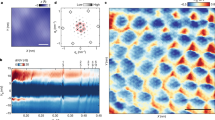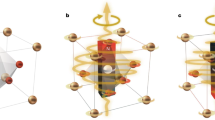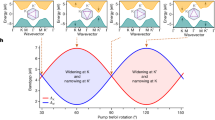Abstract
The coupling between spin and charge degrees of freedom in a crystal gives rise to magneto-optical effects with applications in the sensitive detection of local magnetic order, optical modulation and data storage. In two-dimensional magnets these effects manifest themselves in the large magneto-optical Kerr effect1,2, spontaneous helical light emission3,4 from ferromagnetic (FM) monolayers and electric-field induced Kerr rotation5,6,7 and giant second-order non-reciprocal optical effects8 in antiferromagnetic (AFM) bilayers. Here we demonstrate the tuning of inelastically scattered light through symmetry control in atomically thin chromium triiodide (CrI3). In monolayers, we found an extraordinarily large magneto-optical Raman effect from an A1g phonon mode due to the emergence of FM order. The linearly polarized, inelastically scattered light rotates by ~40°, more than two orders of magnitude larger than the rotation from the magneto-optical Kerr effect under the same experimental conditions. In CrI3 bilayers, the same phonon mode becomes Davydov-split into two modes of opposite parity, which exhibit divergent selection rules that depend on inversion symmetry and the underlying magnetic order. We demonstrate the magneto-electrical control over these selection rules by activating or suppressing Raman activity for the odd-parity phonon mode and the magneto-optical rotation of scattered light from the even-parity phonon mode. Our work underlines the unique opportunities provided by two-dimensional magnets to control the combined time-reversal and inversion symmetries to manipulate Raman optical selection rules and for exploring emergent magneto-optical effects and spin–phonon coupled physics.
This is a preview of subscription content, access via your institution
Access options
Access Nature and 54 other Nature Portfolio journals
Get Nature+, our best-value online-access subscription
$29.99 / 30 days
cancel any time
Subscribe to this journal
Receive 12 print issues and online access
$259.00 per year
only $21.58 per issue
Buy this article
- Purchase on Springer Link
- Instant access to full article PDF
Prices may be subject to local taxes which are calculated during checkout




Similar content being viewed by others
Data availability
The datasets generated during and/or analysed during this study are available from the corresponding author upon reasonable request.
References
Huang, B. et al. Layer-dependent ferromagnetism in a van der Waals crystal down to the monolayer limit. Nature 546, 270–273 (2017).
Wu, M., Li, Z., Cao, T. & Louie, S. G. Physical origin of giant excitonic and magneto-optical responses in two-dimensional ferromagnetic insulators. Nat. Commun. 10, 2371 (2019).
Seyler, K. L. et al. Ligand-field helical luminescence in a 2D ferromagnetic insulator. Nat. Phys. 14, 277–281 (2018).
Zhang, Z. et al. Direct photoluminescence probing of ferromagnetism in monolayer two-dimensional CrBr3. Nano Lett. 19, 3138–3142 (2019).
Huang, B. et al. Electrical control of 2D magnetism in bilayer CrI3. Nat. Nanotechnol. 13, 544–548 (2018).
Jiang, S., Shan, J. & Mak, K. F. Electric-field switching of two-dimensional van der Waals magnets. Nat. Mater. 17, 406–410 (2018).
Sivadas, N., Okamoto, S. & Xiao, D. Gate-controllable magneto-optic Kerr effect in layered collinear antiferromagnets. Phys. Rev. Lett. 117, 267203 (2016).
Sun, Z. et al. Giant and nonreciprocal second harmonic generation from layered antiferromagnetism in bilayer CrI3. Nature 572, 497–501 (2019).
Xi, X. et al. Strongly enhanced charge-density-wave order in monolayer NbSe2. Nat. Nanotechnol. 10, 765–769 (2015).
Méasson, M. A. et al. Amplitude ‘Higgs’ mode in the 2H-NbSe2 superconductor. Phys. Rev. B 89, 060503 (2014).
Tenne, D. A. et al. Probing nanoscale ferroelectricity by ultraviolet Raman spectroscopy. Science 313, 1614–1617 (2006).
Kung, H. H. et al. Chiral spin mode on the surface of a topological insulator. Phys. Rev. Lett. 119, 136802 (2017).
Tian, Y., Gray, M. J., Ji, H., Cava, R. J. & Burch, K. S. Magneto-elastic coupling in a potential ferromagnetic 2D atomic crystal. 2D Mater. 3, 025035 (2016).
Kim, K. et al. Antiferromagnetic ordering in van der Waals 2D magnetic material MnPS3 probed by Raman spectroscopy. 2D Mater. 6, 041001 (2019).
Klein, D. R. et al. Enhancement of interlayer exchange in an ultrathin two-dimensional magnet. Nat. Phys. 15, 1255–1260 (2019).
Lee, J. U. et al. Ising-type magnetic ordering in atomically thin FePS3. Nano Lett. 16, 7433–7438 (2016).
Kim, K. et al. Suppression of magnetic ordering in XXZ-type antiferromagnetic monolayer NiPS3. Nat. Commun. 10, 345 (2019).
Wang, X. et al. Raman spectroscopy of atomically thin two-dimensional magnetic iron phosphorus trisulfide (FePS3) crystals. 2D Mater. 3, 031009 (2016).
Webster, L., Liang, L. & Yan, J. A. Distinct spin–lattice and spin–phonon interactions in monolayer magnetic CrI3. Phys. Chem. Chem. Phys. 20, 23546–23555 (2018).
Jin, W. et al. Raman fingerprint of two terahertz spin wave branches in a two-dimensional honeycomb Ising ferromagnet. Nat. Commun. 9, 5122 (2018).
Larson, D. T. & Kaxiras, E. Raman spectrum of CrI3: an ab initio study. Phys. Rev. B 98, 085406 (2018).
Long, D. A. Raman Spectroscopy (McGraw-Hill, 1977).
Verble, J. L. & Wieting, T. J. Lattice mode degeneracy in MoS2 and other layer compounds. Phys. Rev. Lett. 25, 362–365 (1970).
Song, Q. J. et al. Physical origin of Davydov splitting and resonant Raman spectroscopy of Davydov components in multilayer MoTe2. Phys. Rev. B 93, 115409 (2016).
Castellanos-Gomez, A., Buscema, M. & Molenaar, R. Deterministic transfer of two-dimensional materials by all-dry viscoelastic stamping. 2D Mater. 1, 011002 (2014).
Shubnikov, A. V. & Belov, N. V. Colored Symmetry (Permagon Press, 1964).
Acknowledgements
This work was mainly supported by the Department of Energy, Basic Energy Sciences, Materials Sciences and Engineering Division (DE-SC0012509). Understanding of magnetoelectric switching of Raman optical selection rules is partially supported by AFOSR MURI 2D MAGIC (FA9550-19-1-0390). Work at ORNL (M.A.M.) was supported by the US Department of Energy, Office of Science, Basic Energy Sciences, Materials Sciences and Engineering Division. K.W. and T.T. acknowledge support from the Elemental Strategy Initiative conducted by the MEXT, Japan and JSPS KAKENHI Grant nos JP15K21722. B.H. acknowledges partial support from NW IMPACT. X.X. acknowledges the support from the State of Washington funded and from the Boeing Distinguished Professorship in Physics.
Author information
Authors and Affiliations
Contributions
X.X., B.H. and J.C. conceived the experiment. B.H. and J.C. fabricated and characterized the samples, assisted by E.L.R. and T.S. B.H. and J.C. performed the Raman and magnetic circular dichroism measurements. B.H., J.C., X.X., X.Z. and D.X. analysed and interpreted the results. T.T. and K.W. synthesized the hBN crystals. M.A.M. synthesized and characterized the bulk CrI3 crystals. B.H., J.C., X.X. and D.X. wrote the paper with input from all the authors. All the authors discussed the results.
Corresponding author
Ethics declarations
Competing interests
The authors declare no competing interests.
Additional information
Publisher’s note Springer Nature remains neutral with regard to jurisdictional claims in published maps and institutional affiliations.
Supplementary information
Supplementary Information
Supplementary Figs. 1–8.
Rights and permissions
About this article
Cite this article
Huang, B., Cenker, J., Zhang, X. et al. Tuning inelastic light scattering via symmetry control in the two-dimensional magnet CrI3. Nat. Nanotechnol. 15, 212–216 (2020). https://doi.org/10.1038/s41565-019-0598-4
Received:
Accepted:
Published:
Issue Date:
DOI: https://doi.org/10.1038/s41565-019-0598-4
This article is cited by
-
Fluctuation-enhanced phonon magnetic moments in a polar antiferromagnet
Nature Physics (2023)
-
Coherent helicity-dependent spin-phonon oscillations in the ferromagnetic van der Waals crystal CrI3
Nature Communications (2022)
-
Twist engineering of the two-dimensional magnetism in double bilayer chromium triiodide homostructures
Nature Physics (2022)
-
The helicity of Raman scattered light: principles and applications in two-dimensional materials
Science China Chemistry (2022)
-
Dynamical mean-field theory study of a ferromagnetic CrI3 monolayer
Journal of the Korean Physical Society (2022)



